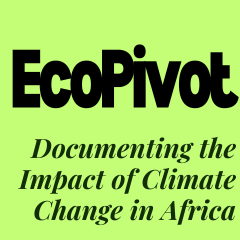Growing up in Lagos, Solomon Ekundayo watched his community succumb to the relentless encroachment of floodwaters.
Year after year, the water rose, swallowing homes and livelihoods, the very essence of life. The culprit—clogged drains, overburdened by the city’s waste, and a swelling sea, driven by forces he would only later come to understand as climate change.
“These experiences made me enthusiastic about promoting climate action for a better environment in Nigeria,” he told EcoPivot. “My continuous activism comes from a place of passion and understanding how the adverse effects of climate change have affected and are affecting vulnerable communities. So I believe that little efforts translate to big impacts.”

Toll on Human Life and Property
Flooding in Nigeria is not just a seasonal inconvenience; it has become a recurring nightmare that disrupts lives and causes widespread destruction.
In 2022 alone, Nigeria experienced one of its worst flooding events in recent history. According to the Nigerian Bureau of Statistics, these floods affected nearly every corner of the country, impacting 80% of its states. The statistics are staggering: over 1.4 million people were displaced, more than 603 lost their lives, and 2,400 others were injured.
The floods did not just take a toll on human life; they also ravaged property and livelihoods; with 82,035 houses damaged and 332,327 hectares of farmland submerged, the economic losses were immense.
At the heart of these problems are rapid urbanization, plastic pollution, poor drainage systems, and deforestation.
Entrenched Environmental Degradation
The fight for environmental justice in Nigeria is a battle waged on multiple fronts, and Ekundayo is acutely aware of the challenges that lie ahead.
“The Nigerian Government has one of the best climate and environmental policies in ‘documentation’. If Nigeria really wants to achieve a fair environment, the stakeholders—policy makers—must begin to implement those policies, regardless of the defaulters,” he told EcoPivot.
The defaulters are not faceless entities, he said. They are the oil companies in the Niger Delta, whose operations have left a toxic legacy of pollution and devastation. It’s a grim reality, one that has turned the region into a tableau of environmental ruin, where the land is as scarred as the people who live on it.
“Nigerian Government can hold the polluters accountable asking them to clean up their mess, compensate the communities affected and practice a more sustainable production process. Honesty, which is an important element, is needed when funding is allocated to address climate issues – they should ensure that it is utilized for the said purposes.”
Deforestation is also a problem, a silent devastator that has stripped Nigeria’s forests bare, leaving behind a barren landscape where biodiversity once thrived. The UNEP Tide Turner Champion said plastic pollution is another battlefront, one that stretches from the crowded markets of Lagos to the quiet shores of rural communities.
Yet, in the face of such daunting challenges, Ekundayo, who is the Director of Plogging Nigeria remains steadfast in his belief that change is possible. He envisions a Nigeria where international collaboration plays a pivotal role, providing the financial resources and technical expertise needed to combat these environmental crises.
“International collaboration can address Nigeria’s environmental issues by providing adequate financial resources for reforestation projects. Partnerships with local advocates and organizations creating change at the grassroots levels are crucial.”

Ekundayo’s vision for an effective solution is not just global—it is also deeply local, rooted in the traditional knowledge and indigenous practices that have sustained Nigerian communities for generations.
“In the ancient times – our forefathers – honored and respected our cultural heritage, for instance, they wouldn’t just cut down trees and they even tagged some forest reserves as ‘Evil forest’; these practices and more helped to conserve our forest reserves and cultural heritage. Our grandmother usually has backyard gardens and practices sustainable farming as they understand how to protect the land. Most of them won’t contaminate the water bodies as they believe it is sacred with the exception of their festive period which is seasonal. We need to integrate all of their practices with a touch of technological advancement to achieve sustainability in Nigeria.”
Ekondayo’s environmental journey paints a picture of a man who sees the interconnectedness of the world, who understands that the solutions to Nigeria’s environmental problems do not exist in a vacuum. They are tied to the global community and the collective action of nations willing to invest in the future of a planet that is rapidly approaching its tipping point.


